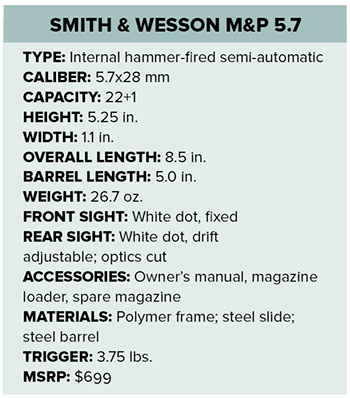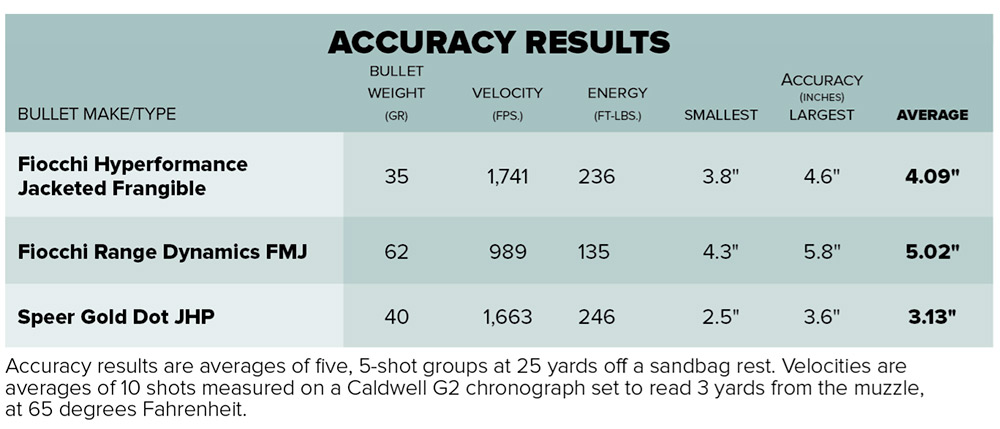
As an instructor, I have often longed for something to bridge the gap between .22 LR and 9 mm Luger, at the very least from a recoil standpoint. Some might say that niche belongs to .380 ACP, but I think that its feel sits too close to the 9 mm to truly fulfill that role.
The 5.7x28 mm neatly fits the void, yet it remains an underrated cartridge that needs some serious reconsideration in the U.S. market. While there are many ideas about why this round never grabbed hold, firearms availability is a definite factor. For decades, there was really only one option, the FN Five-SeveN. Price kept this gem out of reach for most, but Ruger released a 5.7-chambered pistol of the same name some 20 years later. When that inexpensive model hit the scene, ammunition manufacturers started ramping up production of this zippy round, which, in turn, inspired manufacturers to produce more guns. This spiral has been playing out for the last few years and now Smith & Wesson has thrown a polymer hat in the ring: the M&P 5.7.
The M&P 5.7 is interesting for many reasons, but most particularly for its action cycle. Being that 5.7x28 mm operates at a substantially higher pressure than typical pistol ammunition, measures needed to be put in place to ensure the pistol functions and does so safely. In lieu of a simple blowback or recoil-operated mechanism, the M&P 5.7 uses a full-blown gas system that employs one barrel that rotates inside of another, dubbed the TEMPO. When a round is fired, the bullet passes down the inside barrel until it passes a gas port. Here, pressure is applied to the outside of the barrel, which functions like a gas piston and, in turn, gets pushed rearward through the outer barrel shroud. During this motion, it rotates, which unlocks a pair of locking lugs and allows the case to be extracted and ejected. A typical recoil spring and guide rod return the gun to battery, stripping a fresh round off of the magazine and re-cocking the internal hammer in the process.
Although the extra mechanics (really just one part) play a major role in the operation of the pistol, the user benefits from it as well. Being that the gas is delayed, an ultra-heavy recoil spring isn’t required to hold everything together. This means simpler cocking and less of a forward recoil pulse when the slide slams home. Anytime rotation is built into a system, a bit of recoil is lost through that movement, which can make the gun easier to handle and faster to recover.

When my sample arrived, I chuckled when I saw the “M&P” insignias stamped on the frame. This gun stands out from the rest of the series. Its grip is extraordinarily slim, making it a good candidate for in-the-waistband carry, even with a 5-inch barrel. Since the cartridge it fires is a little on the long side, the grip is also inherently long but still comfortable. My hands are large, but on the smaller size of large, and I had no trouble getting my digits wrapped around. Besides, we’re not talking about holding onto a .357 J-frame—the 5.7 kicks little more than a .22 WMR.
 Working my way up, I found a pair of plugs where an ambidextrous thumb safety would go, which S&W offers as an option. There is also a safety built into the trigger bow and an internal firing pin block. For the trigger itself, Smith went with its newer style with a flat face, abandoning the rather unpopular hinge design.
Working my way up, I found a pair of plugs where an ambidextrous thumb safety would go, which S&W offers as an option. There is also a safety built into the trigger bow and an internal firing pin block. For the trigger itself, Smith went with its newer style with a flat face, abandoning the rather unpopular hinge design.
Turning my attention to the slide, I was happy to see an optics cut to accept anything built to the RMSc footprint. This was directly over a pair of deeply machined cocking serrations, which are also found slightly forward of the ejection port. Coupled with the lightened recoil spring, these features make it doubly attractive to those with dexterity issues. For those not into optics, the M&P 5.7 also comes with generous iron sights that wear a conventional three-dot pattern for enhanced low-light visibility. Toward the business end, I observed lightening cuts designed to help balance the gun and remove slide mass to aid in reliability. Lastly, the barrel is threaded to represent the growing acceptance of suppressors, but one might consider screwing a compensator in that spot to make this one of the flattest-shooting pistols in the land.
As Fiocchi has been bringing 5.7 ammunition to the U.S. market in droves, I packed my bag with two of its newest offerings. For speed, I selected its 35-grain Hyperformance load, which features a frangible polymer-tipped bullet. Steel would be on the menu, and for safety’s sake, this was a smart move. On the other end of the spectrum was the company’s subsonic Range Dynamics load, which is built to deliver a heavy (for caliber) 62-grain pill below the speed of sound. These are sure to take away that bark associated with the 5.7x28 mm and make it ideal for use with a suppressor. Lastly, I chose a new twist on an old favorite, Speer Gold Dot.
I kicked things off by stuffing one of the two included 22-round magazines with Fiocchi’s 35-grain load and dumped it into a steel silhouette—for science, of course. As expected, the gun handled like a rimfire but delivered an unmistakable amount of energy to the target. Moving on, and further back, I repeated the process with the Gold Dot, except this time, I transitioned across three different targets. During this test, I was able to experience precisely how fast this gun recovered and was impressed with how well it pointed. For a slim grip, this isn’t always the case. I ended things with the heavy subsonic fodder, which, sadly, the 5.7 didn’t like. Aside from printing slightly larger groups, I had numerous malfunctions, whereas the other rounds had only a few. In my experience, everything chambered in 5.7x28 mm is like a rifle, meaning that it will have rounds that it likes and rounds that it definitely doesn’t. Also, it pays to mention that I wasn’t running a suppressor, which very well might be needed to run the subsonic ammunition smoothly.
My day ended when I polished off my nine boxes of ammo, which happened remarkably quickly. All in all, I loved what Smith did to bring a 5.7 to its stable. This is a good choice for anyone, and for the recoil-shy, or those who have trouble with manipulating a semi-automatic, or anyone who just really prefers to have 23 rounds on deck, it’s excellent. Aside from hitting that proverbial sweet spot in a self-defense realm, the S&W M&P 5.7 is loads of fun to shoot at the range and quite the conversation starter.


































